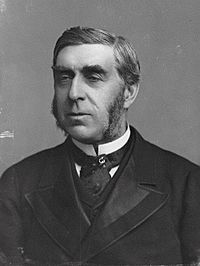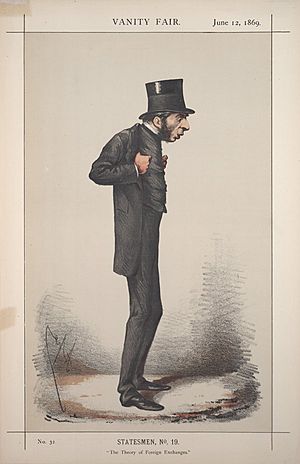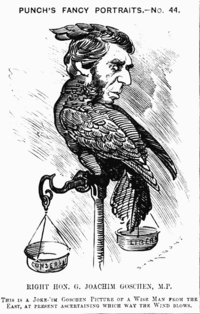George Goschen, 1st Viscount Goschen facts for kids
Quick facts for kids
The Viscount Goschen
|
|||||||||||||||||||||||||||||||||||||||||||||||||||||
|---|---|---|---|---|---|---|---|---|---|---|---|---|---|---|---|---|---|---|---|---|---|---|---|---|---|---|---|---|---|---|---|---|---|---|---|---|---|---|---|---|---|---|---|---|---|---|---|---|---|---|---|---|---|

George Goschen, 1883
|
|||||||||||||||||||||||||||||||||||||||||||||||||||||
| First Lord of the Admiralty | |||||||||||||||||||||||||||||||||||||||||||||||||||||
| In office 29 June 1895 – 12 November 1900 |
|||||||||||||||||||||||||||||||||||||||||||||||||||||
| Monarch | Victoria | ||||||||||||||||||||||||||||||||||||||||||||||||||||
| Prime Minister | The Marquess of Salisbury | ||||||||||||||||||||||||||||||||||||||||||||||||||||
| Preceded by | The Earl Spencer | ||||||||||||||||||||||||||||||||||||||||||||||||||||
| Succeeded by | The Earl of Selborne | ||||||||||||||||||||||||||||||||||||||||||||||||||||
| Chancellor of the Exchequer | |||||||||||||||||||||||||||||||||||||||||||||||||||||
| In office 14 January 1887 – 11 August 1892 |
|||||||||||||||||||||||||||||||||||||||||||||||||||||
| Monarch | Victoria | ||||||||||||||||||||||||||||||||||||||||||||||||||||
| Prime Minister | The Marquess of Salisbury | ||||||||||||||||||||||||||||||||||||||||||||||||||||
| Preceded by | Lord Randolph Churchill | ||||||||||||||||||||||||||||||||||||||||||||||||||||
| Succeeded by | Sir William Vernon Harcourt | ||||||||||||||||||||||||||||||||||||||||||||||||||||
|
|||||||||||||||||||||||||||||||||||||||||||||||||||||
|
|||||||||||||||||||||||||||||||||||||||||||||||||||||
| Personal details | |||||||||||||||||||||||||||||||||||||||||||||||||||||
| Born | 10 August 1831 London, England |
||||||||||||||||||||||||||||||||||||||||||||||||||||
| Died | 7 February 1907 (aged 75) London, England |
||||||||||||||||||||||||||||||||||||||||||||||||||||
| Political party | Liberal Liberal Unionist Conservative |
||||||||||||||||||||||||||||||||||||||||||||||||||||
| Education | Rugby School | ||||||||||||||||||||||||||||||||||||||||||||||||||||
| Alma mater | Oriel College, Oxford | ||||||||||||||||||||||||||||||||||||||||||||||||||||
George Joachim Goschen, 1st Viscount Goschen (born August 10, 1831 – died February 7, 1907) was an important British politician and businessman. He held many high-ranking jobs in the government. Goschen started his career with the Liberal Party. Later, he joined the Liberal Unionists and then the Conservative Party.
As Chancellor of the Exchequer (the person in charge of the country's money), he created the Goschen formula in 1888. This formula helped decide how much money Scotland and Ireland would receive from the government.
Contents
Early Life, School, and Business
George Goschen was born in London, England. His father, Wilhelm Heinrich Goschen, came from Leipzig, Germany. George went to Rugby School and then to Oriel College, Oxford. At Oxford, he studied very well and became the leader of the Oxford Union, a famous debating society.
In 1853, he started working at his father's company, "Frühling & Göschen." Just three years later, he became a director at the Bank of England. From 1874 to 1880, Goschen was the Governor of the Hudson's Bay Company. This is one of North America's oldest companies, known for trading.
Political Career: 1863 to 1885
In 1863, Goschen became a Member of Parliament (MP) for the City of London. He was part of the Liberal Party. He was re-elected in 1865.
He quickly moved up in government:
- In 1865, he became the Vice-President of the Board of Trade and Paymaster General.
- In 1866, he became Chancellor of the Duchy of Lancaster, which meant he was part of the main government team (the cabinet).
- When William Ewart Gladstone became Prime Minister in 1868, Goschen became President of the Poor Law Board. This role involved helping people in need.
- In 1871, he became the First Lord of the Admiralty, in charge of the Royal Navy.
In 1876, he went to Cairo, Egypt. He helped British people who had invested in Egyptian bonds (like loans). He worked out a deal with the Egyptian ruler to manage the country's debt.
Goschen sometimes disagreed with his party, especially about who should be allowed to vote. In 1880, he became an MP for Ripon. He later became an MP for Edinburgh East in 1885. He was offered the job of Viceroy of India and Speaker of the House of Commons, but he turned them down.
When Prime Minister Gladstone wanted to give Ireland more control over its own government, Goschen disagreed. He joined a new group called the Liberal Unionists. This group split from the Liberals because they wanted to keep Ireland fully part of the United Kingdom.
Political Career: 1885 to 1895
In 1886, Lord Randolph Churchill resigned as Chancellor of the Exchequer. Lord Salisbury asked Goschen to take the job, even though Goschen was a Liberal Unionist. Churchill had famously said he "forgotten Goschen" as a possible replacement.
Goschen had to win a new election to become an MP again. He lost one election but then won for St George's, Hanover Square.
As Chancellor, Goschen achieved a big success in 1888. He changed how the country's debt was managed, making it cheaper for the government to borrow money. He also introduced the first UK road tax. This tax was paid on locomotives and carts.
In 1893, Goschen left the Liberal Unionists and officially joined the Conservative Party.
Political Career: 1895 to 1907
From 1895 to 1900, Goschen was again the First Lord of the Admiralty, in charge of the Royal Navy. He retired from politics in 1900. After retiring, he was given the title of Viscount Goschen of Hawkhurst, Kent.
Even after retiring, he stayed interested in public matters. When Joseph Chamberlain started a movement to change trade rules (called "tariff reform"), Lord Goschen strongly supported free trade. Free trade means countries can trade without extra taxes or limits.
Other Important Roles
Goschen was very interested in education. He helped start the University Extension Movement, which aimed to bring university-level learning to more people. He also worked to allow people of all religions to attend universities.
He wrote several books and speeches about money, politics, and education. One of his most famous books was The Theory of Foreign Exchanges, about how money is exchanged between countries. He also wrote a book about his grandfather, The Life and Times of George Joachim Goschen, publisher and printer of Leipzig (1903).
Family Life
George Goschen passed away on February 7, 1907. He married Lucy Dalley in 1857, and they had six children. His oldest son, George, followed in his footsteps. He also became a Conservative politician and served as Governor of Madras.
 | Chris Smalls |
 | Fred Hampton |
 | Ralph Abernathy |



